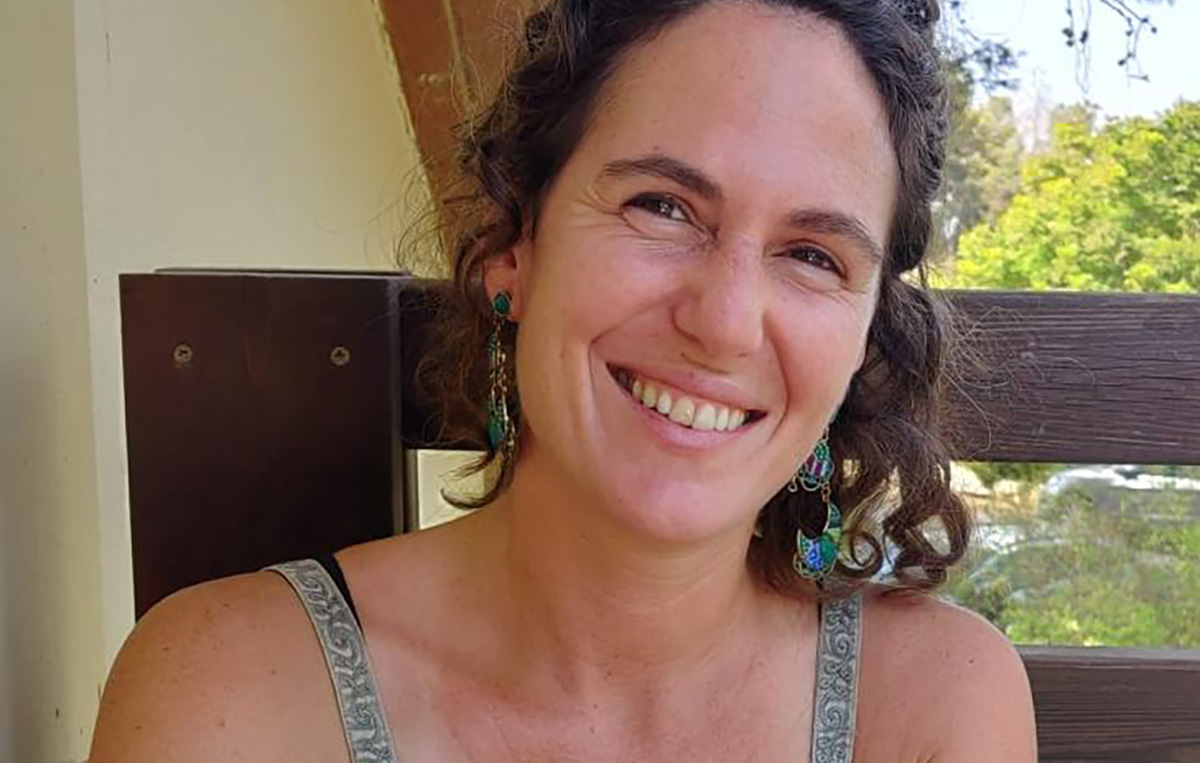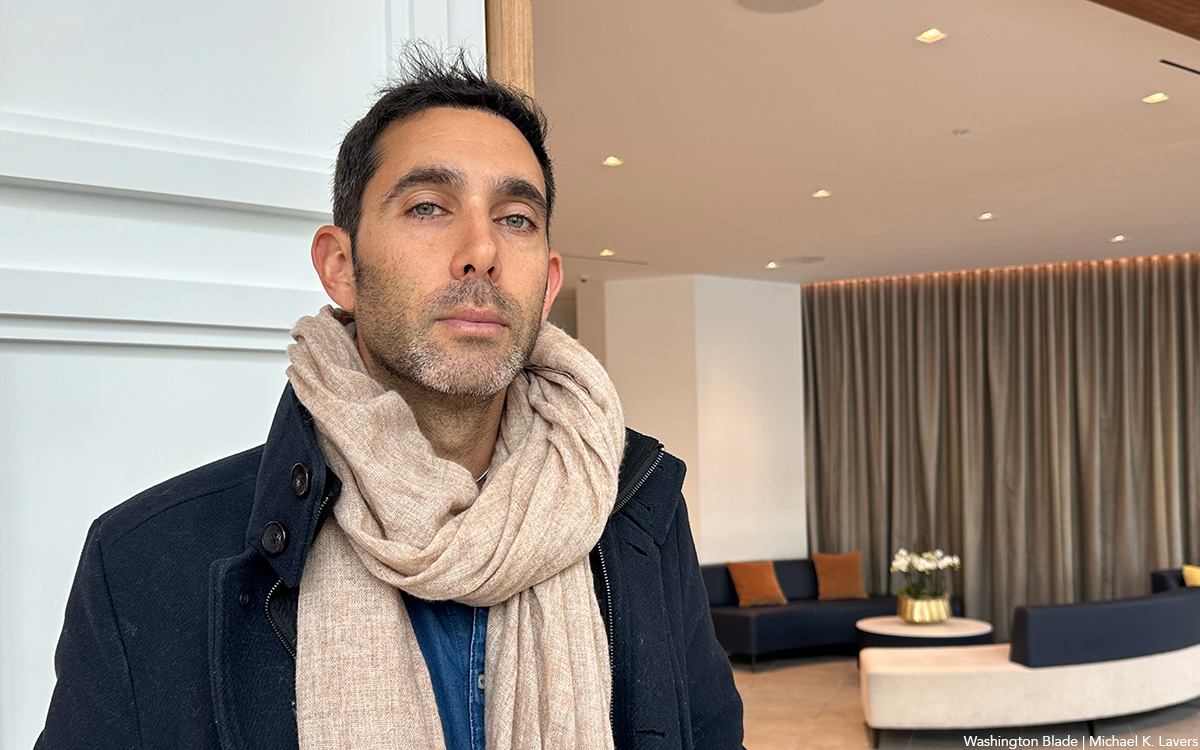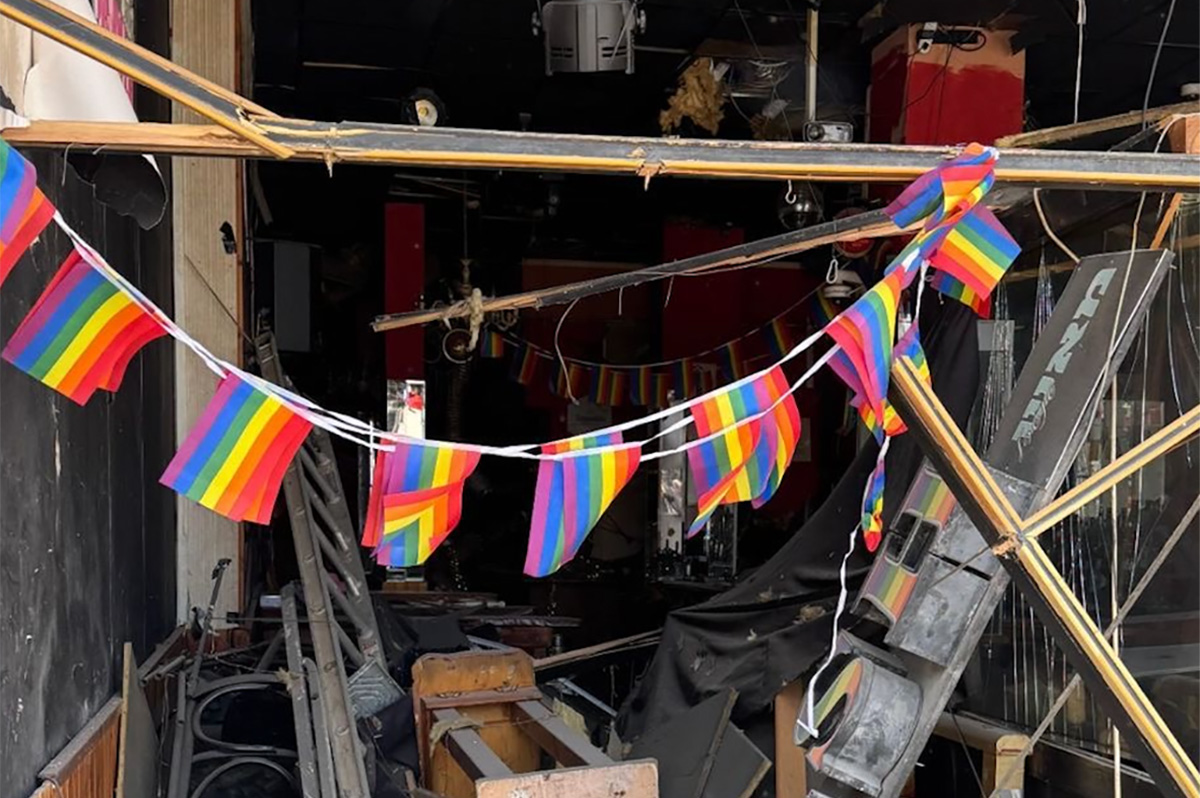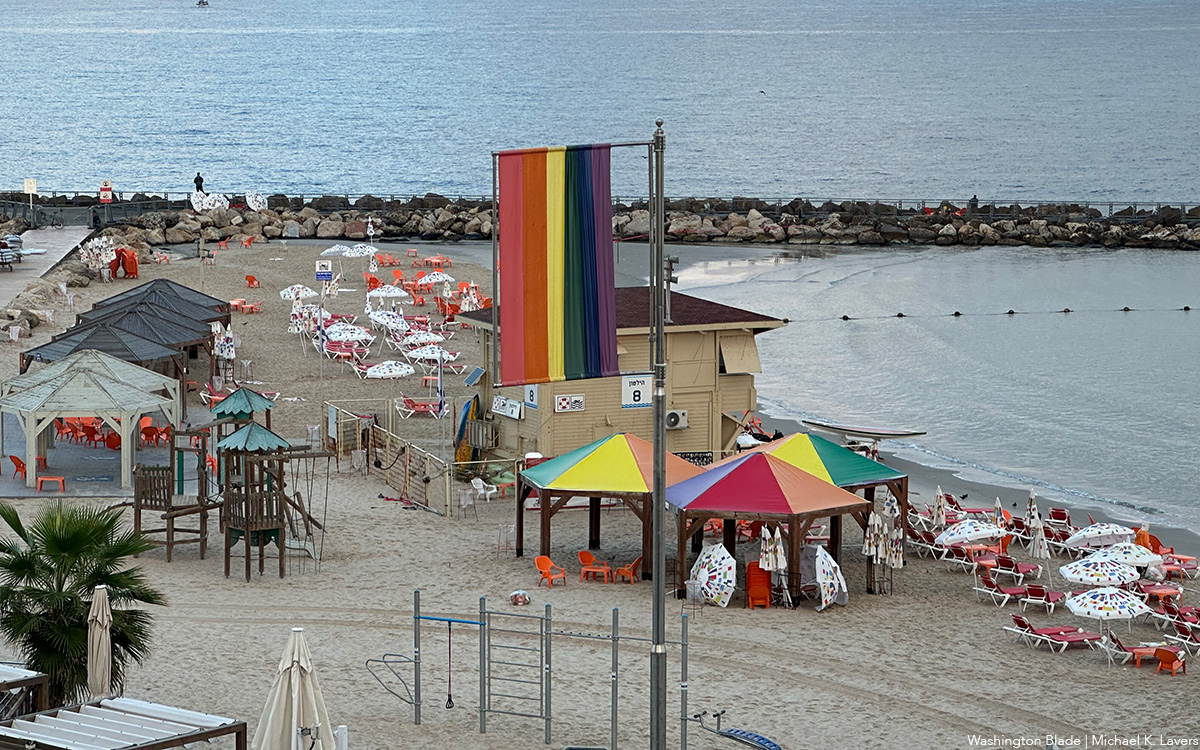Middle East
Gay Israeli man’s sister-in-law among six hostages killed in Gaza
Hamas militants took Carmel Gat hostage on Oct. 7, 2023

The Israeli government on Sunday announced a gay man’s sister-in-law and five other hostages were killed in the Gaza Strip before they could be rescued.
The Israeli Foreign Affairs Ministry in a press release said members of the Israel Defense Forces on Saturday “located” Carmel Gat’s body. The IDF also found the bodies of Hersh Goldberg-Polin, Ori Danino, Alexander Lobanov, Almog Sarusi, and Eden Yerushalmi.
The Associated Press said IDF forces found the bodies in a tunnel underneath Rafah, a city in southern Gaza that borders Egypt. Haaretz, an Israeli newspaper, reported Israeli officials said the hostages “were shot at close range” by Hamas militants on Aug. 29 or Aug. 30.
“This is a difficult day for us,” said Prime Minister Benjamin Netanyahu in a video message. “Together with all citizens of Israel, I was outraged to the depths of my soul by the horrific, cold-blooded murder of six of our hostages.”
“I say to the Hamas terrorists who murdered our hostages and I say to their leaders: You will pay the price,” he added. “We will not rest, nor will be silent. We will pursue you, we will find you, and we will settle accounts with you.”
Gat was visiting her parents in Be’eri, a kibbutz that is near the border of Israel and Gaza, on Oct. 7, 2023, when Hamas launched a surprise attack against southern Israel from the Palestinian enclave it governs.
Hamas militants killed Gat’s parents.
They kidnapped Gat and her sister-in-law, Yarden Roman, and brought them to Gaza. Roman’s husband, Alon Gat, with their young daughter, Geffen, jumped out of the car in which the militants had placed them and escaped before it drove into Gaza. Hamas, which the U.S. has designated as a terrorist organization, released Roman on Nov. 29, 2023.
The Jerusalem Post reported Carmel Gat, an occupational therapist, while in Gaza taught other hostages yoga and meditation to help them endure their captivity.
Her brother-in-law, Gili Roman, a teacher who is a member of Israel’s Nemos LGBTQ+ Swimming Club, included a broken heart emoji in a brief email exchange with the Washington Blade on Sunday.

The Israeli government says Hamas militants killed roughly 1,200 people on Oct. 7, including upwards of 370 partygoers and others at an all-night music festival in Re’im, a kibbutz that is a few miles southwest of Be’eri. Carmel Gat was one of the upwards of 250 people who Hamas militants took hostage.
The Hamas-controlled Gaza Health Ministry says more than 40,000 people have died in the enclave since the war began.
The Washington Post reported an 11-month-old boy in Gaza contracted polio last month, and there are several other suspected cases. UNRWA, the U.N. agency for Palestinian refugees, and the World Health Organization on Sunday began a mass polio vaccination campaign.
Hezbollah, which the U.S. and Israel have designated a terrorist organization, has launched rockets from Lebanon into northern Israel. The Houthis have also launched rockets towards Israel and have attacked commercial ships in the Red Sea.
Iran, which backs the Houthis and Hezbollah, on April 13 launched a drone and missile attack against Israel in response to a suspected Israeli air strike killed two Iranian generals in Damascus, Syria.
An Israeli air strike on July 30 in Beirut killed a senior Hezbollah commander. A suspected Israeli strike in Tehran, Iran, the following day killed Ismail Haniyah, Hamas’s top political leader.
Goldberg-Polin’s parents, Jon Polin and Rachel Goldberg, spoke at the Democratic National Convention in Chicago on Aug. 21.
‘We did not do enough to save our Carmel’
Hundreds of thousands of people on Sunday took to the streets of Tel Aviv, Jerusalem, and other cities and towns across Israel to demand Netanyahu agree to a ceasefire that would secure the remaining hostages’ release.
Carmel Gat’s family in a statement to the Jerusalem Post on Sunday said it refused to meet with Netanyahu.
“We have no interest in speaking with the person responsible for Carmel’s death or in being part of his media circus,” said the family. “We will not allow him to use us as justification or legitimacy for the murder of the next hostage. The blood of the hostages is on his hands.”
“We did not do enough to save our Carmel,” it added. “We ask that for the memory of Carmel and for the rescue of the hostages still in captivity — take to the streets and shut down the country until everyone comes home.”
A Wider Bridge in an email it sent to supporters on Sunday said “the horrifying news of the Hamas murder of six hostages — Ori Danino, Carmel Gat, Hersh Goldberg-Polin, Alexander Lobanov, Almog Sarusi, and Eden Yerushalmi — cuts deep.”
“In a sense, they are all our family,” reads the email. “The six were found executed in a tunnel in Rafah as their rescue was becoming a possibility.”
A Wider Bridge said it also “came to know Hersh through his parents’ advocacy, which brought his story and the plight of all the hostages to millions.” The email also notes A Wider Bridge “has also grown close to the family of Carmel Gat” since Oct. 7.
“She was stolen from Kibbutz Be’eri along with her sister-in-law, Yarden,” said A Wider Bridge. “Yarden’s brothers, Gili and Nili, are gay men active in the Israeli LGBTQ community and involved in the hostage families group. They have spoken with our community on several AWB programs. We exhaled a little when Yarden was released from the hellscape in which her cousin remained, and we are devastated by their pain today at the execution of Carmel.”
Israel
Activist recalls experience in Tel Aviv after Israel-Iran war began
Marty Rouse was part of Jewish Federations of North America Pride mission

A long-time activist who was in Israel last month when its war with Iran began has returned to D.C.
Marty Rouse traveled to Israel on June 6 with the Jewish Federations of North America. The 5-day mission ended the night before the annual Tel Aviv Pride parade was scheduled to take place.
Mission participants met with Israeli President Isaac Herzog and several LGBTQ activists in Tel Aviv and Jerusalem. They visited the Western Wall, the Nova Music Festival site, and Nir Oz, a kibbutz in southern Israel that is less than a mile from the country’s border with the Gaza Strip. Mission participants also visited Sderot, a city that is roughly a mile from the Hamas-controlled enclave, a veterans rehabilitation facility, a new LGBTQ health center and the Aguda: The Association for LGBTQ Equality in Israel in Tel Aviv.
Hamas militants on Oct. 7, 2023, killed upwards of 360 partygoers and kidnapped dozens more at the music festival that was taking place at a campground near Re’im, a kibbutz that is roughly 10 miles southwest of Nir Oz. The militants killed or took hostage nearly a quarter of Nir Oz’s residents. They also took control of Sderot’s police station.

Tel Aviv Deputy Mayor Chen Arieli spoke at the mission’s closing party that took place at the Sheraton Grand, a hotel that overlooks Tel Aviv’s beachfront, on June 12.
Rouse and other mission participants planned to stay in Tel Aviv for the Pride parade, which was scheduled to take place the following day. He and Gordie Nathan, another mission participant who lives in Palm Springs, Calif., had checked into a nearby hotel that was less expensive.
“We said our farewells,” recalled Rouse when he spoke with the Washington Blade in D.C. on June 24. “We went to our hotels, and we get the warning, and then all hell broke loose.”
Israel early on June 13 launched airstrikes against Iran that targeted the country’s nuclear and military facilities.
Rouse said mission organizers told him and other participants who remained in Tel Aviv to meet at the Sheraton Grand for breakfast and dinner — Israel’s airspace was closed in anticipation of an Iranian counterattack, and authorities cancelled the Pride parade.
He said he went to bomb shelters at least twice a night for three nights.
Israel’s Home Front Command during the war typically issued warnings about 10 minutes ahead of an anticipated Iranian missile attack. Sirens then sounded 90 seconds before an expected strike.
Rouse and Nathan walked to the Sheraton Grand on June 13 when the Home Front Command issued a 10-minute warning. They reached the hotel in a couple of minutes, and staff directed them to the bomb shelter.
“You know to walk slowly, everything’s fine,” recalled Rouse. “You get 10 minutes, so everything was fine when the alarm goes off.”
Rouse described the Sheraton Grand shelter as “well lit” with WiFi, a television, and air conditioning. He was watching an Israeli television station’s live coverage of the Iranian missile attack when he saw one hit an apartment building in the Tel Aviv suburb of Ramat Gan.
A 74-year-old woman died and her boyfriend was seriously injured.
“I go over to look at the TV, just to watch,” recalled Rouse. “All of a sudden, you watch, and you see one bomb go and land and explode in Tel Aviv on TV. It landed and blew up.”
“I was like, okay, this is real, and so that was scary,” he added.
Rouse said the bomb shelter in the hotel where he and Nathan were staying after the mission ended was far less comfortable.
“It was dark. It was humid. It was hot. It was very uncomfortable,” said Rouse. “You really felt alone.”

Rouse and nearly everyone else on the mission who were in Tel Aviv when the war began left Israel on June 15. They boarded buses that took them to the Jordanian capital of Amman, which is a roughly 2 1/2-hour drive from Tel Aviv through the West Bank.
Rouse described the trip as “like a field trip” until they drove across the Jordan River and arrived at the Jordanian border crossing.
“You walk into this room, and instead of being in a well air-conditioned airport, you’re in this hot, humid, small place in the middle of the desert, packed with people, and those big, large, loud fans and pictures of military people on the walls,” he said. “It was almost like a Casablanca kind of feeling.”
Rouse said Jordanian authorities brought mission participants through customs in groups of 10. A Jewish Federations of North America liaison from Amman who previously worked as a tour guide for A Wider Bridge — a group that “advocates for justice, counters LGBTQphobia, and fights antisemitism and other forms of hatred” — went “behind closed doors” to ensure everyone was able to enter the country.
“It took a really long time,” Rouse told the Blade.

Mission participants arrived in Amman a short time later. They checked into their hotel and then had dinner at a restaurant.
“Now we feel like we’re safe and we’re in Amman,” recalled Rouse. “We’re sitting outside having a beautiful dinner.”
Iranian missiles passed over Amman shortly after Rouse and the other mission participants had begun to eat their dessert. They went inside the restaurant, and waited a few minutes before they boarded busses that brought them back to their hotel.
“No one was openly freaking out, which I was surprised by,” said Rouse.
The group was scheduled to fly from Amman to Cairo at 11 p.m. local time (4 p.m. ET) on June 16. They visited Jerash, an ancient city north of Amman, before their flight left Jordan.
“[The Jerash trip] actually took our minds off of everything,” said Rouse.
A Jewish Federations of North America contact met Rouse and the other mission participants at Cairo’s airport once their flight landed. Rouse arrived at JFK Airport in New York on June 17.
Trump-announced ceasefire ended 12-day war
President Donald Trump on June 23 announced a ceasefire that ended the 12-day war.
The U.S. three days earlier launched airstrikes that struck three Iranian nuclear sites. The ceasefire took effect hours after Iran launched missiles at a U.S. military base in Qatar.
Iran said the war killed more than 900 people in the country.
The Associated Press notes Iranian missiles killed 28 people in Israel. One of them destroyed Tel Aviv’s last gay bar on June 16.
The war took place less than two years after Oct. 7.
The Israeli government says Hamas militants on Oct. 7, 2023, killed roughly 1,200 people on that day when it launched its surprise attack on the country. The militants also kidnapped more than 200 people.
The Hamas-controlled Gaza Health Ministry says Israeli forces have killed nearly 55,000 people in the enclave since Oct. 7. Karim Khan, the International Criminal Court’s chief prosecutor, has said Israeli Prime Minister Benjamin Netanyahu and former Hamas leader Yahya Sinwar, who the IDF killed last October, are among those who have committed war crimes and crimes against humanity in Gaza and Israel.

Rouse upon his return to the U.S. said he “was never as aware of the comfort of another human being than I was during that time.” Rouse affectionately called Nathan his “bomb shelter boyfriend” and even questioned the way he reacted to the missile alerts.
“He’s sitting on the edge of the bed and he goes, okay, I’m going to put on my socks and my shoes, and I say, really? You’re going to put on your socks,” Rouse told the Blade. “The fact that I was nervous, that putting on socks might have changed the direction of our lives, to me was like I can’t believe I said that to him.”
Rouse quickly added Nathan helped him remain calm.
“If I was by myself, those nights would have been long enough,” said Rouse. “It’s a totally different feeling to be with another human that you know than to be by yourself.”

Rouse also praised the Jewish Federations of North America.
“JFNA really sprung into action and started to figure out all options to get us all safely home,” said Rouse. “It was all about logistics. Staff worked around the clock identifying and then mobilizing to get us back to the states. It was a great team effort and I know I speak for everyone in expressing our deep appreciation for their dedication to getting us safely home.”
Israel
Iranian missile destroys Tel Aviv’s last gay bar
Mash Central is a few blocks from US Embassy

An Iranian missile on June 16 destroyed a gay bar in Tel Aviv, Israel.
The missile struck Mash Central, which is a few blocks from the U.S. Embassy on Allenby Street, and surrounding buildings. Israeli sources confirmed to the Washington Blade that Mash Central was the only gay-specific bar in Tel Aviv.
“Iran’s missile strike yesterday destroyed Tel Aviv’s only dedicated gay bar,” reads one Instagram post with pictures from inside the bar. “This place provided a safe space for minorities to express themselves — now it’s trashed.”
Mash Central describes itself as Tel Aviv’s “last gay bar standing,” even though the city promotes itself as one of the world’s most LGBTQ-friendly cities.
Israel on June 13 launched airstrikes against Iran that targeted the country’s nuclear and military facilities. Iran since the war began has launched hundreds of missiles towards Israel.
Tel Aviv’s Pride parade was scheduled to take place on June 13, but authorities cancelled it. Caitlyn Jenner, who was to have been the event’s guest of honor, is among those who were stranded in Israel after the war began.
Israel
Tel Aviv Pride parade cancelled after Israel attacks Iran
Caitlyn Jenner was to have been guest of honor

Tel Aviv authorities on Friday cancelled the city’s Pride parade after Israel launched airstrikes against Iran.
The Associated Press notes the Israeli airstrikes targeted nuclear and military facilities in Iran. Reports indicate the airstrikes killed two top nuclear scientists and the leader of Iran’s Revolutionary Guard.
Iran in response to the airstrikes launched more than 100 drones towards Israel. The Israel Defense Forces said it intercepted them.
The Tel Aviv Pride parade had been scheduled to take place on Friday. Caitlyn Jenner was to have been the event’s guest of honor.
Authorities, in consultation with local LGBTQ activists, last year cancelled the Tel Aviv Pride parade out of respect for the hostages who remained in the Gaza Strip after Oct. 7. Jerusalem’s annual Pride parade took place on June 5.
-

 U.S. Supreme Court1 day ago
U.S. Supreme Court1 day agoSupreme Court to consider bans on trans athletes in school sports
-

 Out & About1 day ago
Out & About1 day agoCelebrate the Fourth of July the gay way!
-

 Maryland4 days ago
Maryland4 days agoSilver Spring holds annual Pride In The Plaza
-

 Opinions4 days ago
Opinions4 days agoSupreme Court decision on opt outs for LGBTQ books in classrooms will likely accelerate censorship











